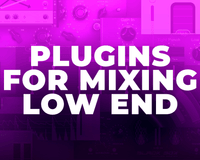Table of Contents
- Why Music Feedback Is Important
- Types of feedback
- Things to know
- Asking for feedback
- Just ask
- Ask for feedback when you’re ready
- Who to ask
- Select your audience carefully
- Contact professionals or musicians you admire
- Asking peers
- Asking connoisseurs
- Asking casual listeners
- Build a feedback network
- Groups and Forums
- Feedback Services
- How to ask
- Don’t haunt people
- Ask follow-up questions in real-time
- How to deal with feedback
- Pay attention to how you react to criticism
- Don’t jump to conclusions
- Don’t make excuses
- Be Open-Minded
- How to get the most out of feedback
- Take Notes
- Keep your feedback organized
- Make a Wrong a Right
- Give to Get
- Don’t deflect any Feedback
- When is Feedback Not Worth Taking Seriously?
- Stay Positive
- Apply
- Conclusion
- Download our free checklist
- Want feedback from us?
Why Music Feedback Is Important
Feedback is an essential part of development, especially in creative fields such as songwriting, production, mixing, and mastering.
Objectivity
Seeking feedback on your work will help you improve any if not all of these skill sets.
We tend to become so immersed in the process that it’s hard to detach from our music and listen to it objectively.
The reason is simple: you’ve spent more time listening to it than anyone else. Music production consists of piling sounds on top of each other and this requires playing certain sections over and over again.
Doing this will make you biased toward it in one way or another - maybe you think that the kick you picked is great or that the melody doesn’t need any more work.
The opposite can happen as well, which is you might end up hating something that other people love instead.
You just can’t have an actual first impression of your product, but other people can, and that’s why you ask them for feedback.
Keep in mind that you can’t have true objective feedback from anyone just because people have their own taste, but you can get close enough.
Mixing Problems
Detaching from how your music sounds is as difficult as detaching from the core idea.
Spending hours and hours on a mix without a real asset of experience and without programmed rest can easily fool your ears and lead you to bad choices.
Professional mixing engineers are able to minimize this problem because they need to work fast in order to deliver the finished product as quickly as possible and also because they work on a lot of stuff daily and are able to recognize what doesn’t sound good for your purpose.
Remember that there are some standards that you should respect at least partially; this is also why most engineers are specialized in a few genres, just as there are different types of doctors.
EDM tracks mostly have a tight and heavy low-end, and that’s not because producers want to homologate to others because they have no personality, but they just want to get what’s best for their purposes. In fact, having a house track that sounds weaker or just a lot different from other tracks can keep it from being played at gigs or being featured in a prestigious playlist.
The same goes for Hip Hop where the vocal dominates. I’ve known a few EDM producers who wanted to apply the same mixing methods at some Hip Hop projects, and guess what?
It mostly didn’t work out well.
New Ideas
Useful music feedback will give you a new perspective on your work, whether it’s positive or negative. Depending on how and who you ask to, it can drive artistic decisions as well. Feedback can even help you overcome writer’s block.
You might think that your track is ok and go out asking for some feedback on the mix and unexpectedly come back with a handful of tips on how to make your melody more interesting and evolving throughout the whole arrangement or some sound design trickery to bring more detail to the drop.
It also happened that I transposed the whole project to another key that I didn’t even consider.
This said, feedback can be used to not just solve problems in your track, but also to enhance it.
Improvement
Receiving feedback is also an opportunity to learn new techniques, to go more in-depth with stuff you already know something about, or to discover a new approach to things you’ve been doing repeatedly.
If you keep getting comments on your melodies and chord progressions, that’s a signal that you should work more on your music theory.
The same goes for mixing, remember the EDM producers trying to make Hip Hop that I mentioned earlier? I found myself suggesting them to go lighter with sidechain because it wasn’t as needed as in their other bass-heavy tracks.
Types of feedback
Music is a form of art which is plenty of layers, and this reflects itself on the feedback you receive as well. Knowing these types of feedback helps you to apply it in the best way possible.
Technical
Technical feedback is specific. Like “the kick sounds over compressed” or “the instruments aren’t panned very well”. It’s the most practical kind of feedback because it clearly tells you what to do.
Creative
This type of feedback deals with your songwriting choices. If you have a House track, but you want to blend it with some Trap elements, you might ask around if it sounds like a good match. If you have different takes from different vocalists on the same project, you might ask around which one fits the music best.
Directional
This has to do with your artistic vision as a whole. If you have a genre-based project, consider asking a few trusted people if it’s a good move before you make drastic career moves.
Opinion
This is the hardest type of feedback to apply because it limits itself on whether the product is good or bad. You need to know who is listening to it, their level of expertise, and their ability to detach from their mere personal tastes in order to consider anything coming out of their mouth. Don’t let this type of feedback keep you from making more art.
Things to know
Know your artistic objective for the song
Music is meant to evoke an emotional feeling. It’s important to know how your music makes people feel. If you made a hard-hitting banger, try asking if it makes them feel pumped and energetic.
Evoking a specific emotion is a skill you develop with time and it’s still a hard challenge for experienced songwriters as well. Bias plays a role in the way people perceive music, someone might feel chilled by a happy sounding Trap beat and someone else might feel disturbed because he/she is not used to the tight drum patterns Trap beats usually feature.
Let the listener know what you want to communicate with your production.
Know your commercial objective for the song
Music is also about business, so make sure to point that out once you send it out for feedback. If you produced a Trap beat, you might upload it on your beat store or you might send it out for commercials. These two goals both require different arrangements and mixing choices. However, keep in mind that it’s hard to get useful feedback from someone who doesn’t have much or even any experience at all in a particular industry.
Asking for feedback
Just ask
It’s simple as that. If you aren’t getting any feedback, just reach out to someone you trust and ask for it. If they accept, then it’s a win-win as they get better from teaching and you get better from learning.
Ask for feedback when you’re ready
Asking for feedback means taking someone’s time out of their day and schedule to listen to your music. That’s a lot, but in an era where we are full of work to do and also full of distractions to fight against, this can be perceived as a distraction from their goals.
Now that you know this, you should keep in mind to make it easy and ready for them to give feedback.
What does this mean in practice? Send out a work that you truly believe it’s worth giving a listen to and that is as close as possible to being finished.
Sliding into someone’s chat with a half-assed work is disrespectful to others and it’s a disservice to you and your work.
What do you expect to get back from it? Probably just a quick and disinterested answer such as “I don’t know, it sounds poor/flat/whatever”.
Don’t even come up with “hey, don’t pay attention to this, that, that #2, that #3...” and so on. You’re already compromising the first impression and wasting an opportunity to actually improve.
Remember that you need to show how good you are in order to receive feedback that will help you improve.
Make sure the track is loud enough to hear, making it appear as a finished product. This will make the listening experience more enjoyable to the listener, which will translate in richer and more accurate feedback.
Consider forgetting about your track for some days or even weeks. This trick reveals incredible details you can’t initially see or hear. You might not believe how detached from it you can become.
Who to ask
Select your audience carefully
Now that you’re ready to receive feedback, you should know that people are all different, with different tastes, different levels of expertise, and also different levels of interest towards you. Just deal with it, asking for feedback is social interaction and you also need to take this factor into account.
Contact professionals or musicians you admire
This should be your very first choice simply because these kinds of people are more likely to give quality and reliable feedback. Keep in mind that they are most likely to spend less time after you than other types of audiences as they might have a tight work schedule to stick to.
Asking peers
This is a bet depending on their level of expertise. The higher your levels are, the more chances you have to get quality feedback under all aspects.
However, there are different types of peers: there are some really good at songwriting but not (as good as you) at mixing and vice versa.
Asking connoisseurs
These are quite rare to find because they have an understanding of what sounds good, but they’re not “sound guys” themselves.
Anyway, they are really precious, especially when you are consulting them for a project of a genre they listen to a lot.
Asking casual listeners
In this scenario, expect to get some general feedback. This type of feedback usually is better when you want to know if the motif and the structure work rather than the mix and master themselves. If your mix sounds pretty bad, there’s a chance the listener will be able to recognize that and put it into words.
The most challenging thing here is to have them explain what they like and what they don’t, simply because they’re not into music production and don’t have the tools, terminology, and awareness to give you accurate feedback.
However, this is precious as well because it can be a preview of the impact your work will have once released. At the end of the day, music is listened to by more non-audio people than by audio people.
Build a feedback network
You don’t really need feedback from many people, especially when you’re fairly experienced.
Consider building some solid relationships with a few trusted people. Your life will be easier because you already know who to reach out to and you will also have a set team of listeners that you know how they interpret music and you also know how to interpret their comments on your work.
Groups and Forums
If you don’t have anyone close to ask to, then just join some Facebook groups, go on Reddit or on a forum and try your luck.
You don’t know the level of expertise of the people who are going to comment on your work, but you can get an idea based on the level of detail in their words.
Feedback Services
You can find a bunch of professional services online that allow you to get detached feedback.
We offer this service as well at https://beatspot.pro/products/feedback
How to ask
Show interest
Nobody wants someone to pop out of nowhere with a “hey can you give me feedback?”, especially if you don’t know them. People can sense shameless self-promotion.
Try engaging them in a conversation, whether deep or casual depending on who you are talking to. Put them in a condition they want to spend some time after you.
Not only will you not get the feedback you need, but you’ll also lose a listener forever.
Be organized
If you are via chat, make sure you are sending out the link to the right track and also pay attention if it’s broken or expired. You will both save time, which is precious.
You can consider uploading a private track on Soundcloud or LANDR annotated player to get feedbacks at several points of your arrangement.
This is incredibly efficient when you have variegated arrangements and/or you want to get feedback on specific parts and transitions.
If you are face to face, then keep your track stored in an easily reachable folder. It might be quite embarrassing looking like you don’t know where you put your things. Also, make sure you have a pair of earbuds if you are hanging around or keep your AUX chord ready if you are in the car together.
Provide Instructions
Try summing up in a sentence what you want from the person you asked to critique. This is particularly efficient when asking a professional that could spend floods of words on each tiny detail. If you just want to know a few things, just make it clear so the process is even easier. However, there are times where I just want an opinion on a single thing and that’s what I ask feedback on.
You could say something like:
I’m not sure about the kick-bass relationship. Could you take a listen to it and spend a couple of lines about it?
Ask for honesty
You should be open and put the listener in a position of talking without being worried about anything, like getting offended. With time, I learned how to take the hit. I usually go to some peer and say “please, roast my track as much as you can”, just because I want to get them to be as brutal as possible.
Don’t haunt people
If you agree with what’s written and also make sure to practice it, this won’t be a problem.
However, you should know that you will only get people’s attention for so long.
Coming back with several versions of a track will make them not care anymore pretty quickly unless they’re deeply involved in it, especially when you each version doesn’t have fairly reasonable and noticeable improvements from the previous ones.
Ask follow-up questions in real-time
If you’re getting feedback from a face to face or a chat conversation, then take advantage of it to ask more about a certain thing. Maybe you didn’t understand a certain recommendation and it’s way better trying to understand it rather than having the doubt of not getting it. Remember that your goal is to improve.
How to deal with feedback
Pay attention to how you react to criticism
We might tend to get a bit too attached to our work and some people just can’t even take a bad comment. It’s understandable, we’ve all felt this way at least once, but you need to grow up and accept the fact that there’s some more work to do.
Bad comments might hurt, especially when they’re rude, but try asking yourself if that person still has a point.
In the art business, it’s quite common to be critiqued. Some people just can’t accept the fact that you’re being yourself, so let them go.
However, handling criticism well will open doors that defensive musicians won’t ever walk through, and it will also help you build long-term relationships with other professionals in your industry.
Don’t jump to conclusions
Interrupting and trying to explain why you did something a certain way isn’t any respectful. As long as they spent time after you, let the listeners expose the whole feedback, it helps them get to the core of what they’re trying to say.
Don’t make excuses
One of the most irritating things you can do is saying “actually, this is not finished yet”, when someone is pointing out some things that need more work.
Just don’t do it, you will look like an insecure and miserable person that can’t deal with any criticism, even when it’s genuinely constructive. People just don’t like this kind of behavior.
Be Open-Minded
You can expect two types of feedback - good and bad.
When someone takes the time to listen to your track and gives their honest impression about it, then that person cares, and your music matters to him. That person you’re talking to doesn’t have any personal vendetta against you, so just keep in mind that he/she is giving you what you asked for - his/her viewpoint. Most of the time you won’t hear what you were expecting to, and that means you still have room for improvement, which is nice to know!
How to get the most out of feedback
Take Notes
Write down anything and keep it there for later, especially if someone is flooding you with tips and/or you’re receiving feedback from several people.
Having everything written down, and possibly grouped together, will help you get an overview of what has been critiqued the most and what the least, giving you a sort of priority list to the improvements you’re going to implement.
Keep your feedback organized
Collect all the comments on a file and try formatting it so you can easily scan it later.
Group together all the creative tips into one page and all the technical ones into another page.
If you planned to apply these tips in a few days, then save the document in the project folder, so the next time you open it, you will have your To-Do list by your side.
If you’re making multiple versions of your project, name the text file the same way as the project file so you know which version it refers to.
Make a Wrong a Right
If you’re told that something isn’t sounding right, or you did something incorrectly, ask how to fix it. It’s absolutely legit to ask for a solution. Doing this turns negative feedback into constructive feedback and gives you something concrete to work on. Last but not least, this is a way to test the level of competence of the listener.
Give to Get
Reciprocating is key in most relationships of any kind. Put in all the effort and positivity you would like others to put when commenting on your work. It might sound weird, but most people feel the need to reciprocate when someone else is giving them a lot, mostly because they can’t accept the fact of looking ungrateful.
People remember all the little things you’ve done for them. When you ask for feedback on your own music, they’ll be more willing to help if you gave them tips in the past.
Don’t deflect any Feedback
Unless you have some understandable reasons, if you aren’t willing to give feedback when someone is asking you, then you shouldn’t even consider coming back to that person asking for some feedback. It might sound obvious, but there are still people like this around and if you’re one of them, well, now you know how things go.
When is Feedback Not Worth Taking Seriously?
- When someone implies that you should change something in the arrangement or sound design based on their tastes. Most of the time, this kind of people won’t be able to prove why you should do this or that, being vague all the time.
- When someone discusses some so-called “unwritten rules” about how music “should” be made (ex. you have to make all your sounds from scratch, you can’t use samples, etc).
- When someone wants to force you to see your track from their own point of view for the mere reason that they can’t understand your vision.
Stay Positive
Every bit of constructive criticism will help you forward in your growth as an artist and as a professional. Believe it or not, every artist ever has been told something negative about their music or been told ‘no’.
Apply
After all the efforts you made at asking for feedback and dealing with it, do you really want to ignore it? It’s time to get your hands dirty, again.
Some feedback won’t work, but at least give it a try. Don’t underestimate feedback that suggests making small changes. That might be what you actually needed!
If you apply some tips and you see that they’re working, you can keep them in mind for your next projects, and guess what? You might need feedback less than ever for the simple reason that you improved.
Conclusion
Build a healthy mindset and remember to be nice, specific, and know why you’re asking for feedback. Be grateful as well and show your will to reciprocate!
Download our free checklist
We put together a checklist that sums up all the points in this article that you should consider before you ask for feedback. You can download it here, or find it among our Free Downloads.
Want feedback from us?
We are offering a very in-depth Feedback service to all those looking for a helping hand from professionals who worked on a lot of music.










